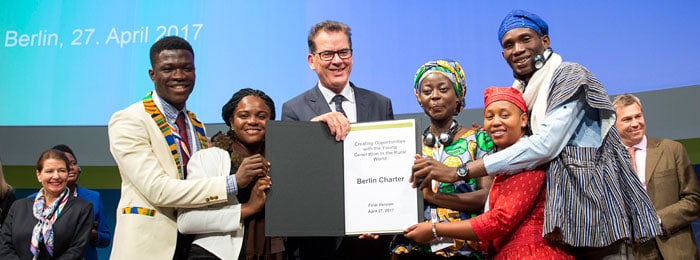
Image credit: Inga Kjer/photothek.net via www.bmz.de
Rural areas have a crucial role to play in securing the future of humanity, achieving global prosperity, and finding solutions to eradicate hunger and poverty through securing global food supplies. This was the message echoed by international stakeholders from government, the private sector, academia, and civil society who met at the ONE WORLD – No Hunger. Future of the Rural World G20 conference in Berlin to present options for addressing youth employment in rural areas.
A key output of the conference, organized by the German Federal Ministry for Economic Cooperation and Development in the framework of the G20 German Presidency, was the “Berlin Charter” which was delivered to Dr. Gerd Müller, German Federal Minister for Economic Cooperation and Development. The Charter is expected to provide political impetus and guide decision-makers from within national governments, business and civil society, to increase their involvement in efforts to boost rural development and youth employment.
As a member of the International Advisory Committee in charge of drafting the Charter, Dr Bruno Losch was directly involved in the final process and was one of the “advocates” of the Charter Fora sessions and particularly in charge of relaying the results of the session on Entrepreneurship, jobs and skills to the drafting committee. Among some of the issues raised during this session was the need to invest in global development strategies and provide innovative solutions to rural challenges. “The rural world is not an island,” said Losch, “we need to understand the processes underway in order to engage in better policy making to address developmental challenges.”
Dr Losch is the co-director of the Center for the Study of Governance Innovation (GovInn) – a joint research center between the Universities of Pretoria and the Western Cape, and the French Cirad (Centre de Coopération Internationale en Recherche Agronomique pour le Développement ), where he is a lead political economist. He is also a co-Principal Investigator for the Centre of Excellence in Food Security’s (CoE) Policy programme.
Aiming for transformative change, contributors also called on the G20 governments to commit to significant, quantified and time-bound targets in line with the Sustainable Development Goals (SDGs) such as lifting at least 600 million people out of hunger and undernutrition by 2025 with appropriate agricultural, nutrition and anti-poverty policies. In addition, contributors called on governments to significantly reduce the malnutrition of hidden hunger affecting about 2 billion people worldwide.
Food security and social protection were also highlighted as critical to global development policies. Professor Sheryl Hendriks, Director of the Institute for Food, Nutrition and Well-being at the University of Pretoria and advocate of one of the sessions said: “To ensure we don’t leave anybody behind, nutrition and social protection are important components for development. To be able to deliver on these, we need to think about issues beyond nutrition such as sanitation, providing adequate facilities for mothers and childcare, as well as finding alternative livelihoods such as ecosystem services and protecting the environment.” Hendriks is the former co-director of the CoE.
Watch Dr Losch and Professor Hendriks’ comments shared in a video presented to the audience below
related Articles
Greater Cape indigenous foods back on the map with groundbreaking partnership
Pickled veldkool. Photo: Loubie Rusch. A groundbreaking new partnership between the DSI-NRF Centre of Excellence in Food Security (CoE-FS), Local…
Localised food systems key to economic inclusion and environmental sustainability
Photo by Ashraf Hendricks. Localised food systems key to economic inclusion and environmental sustainability by Neil Overy, Daily Maverick May…
Community of Practice renamed in keeping with its COVID-enforced remaking
When, in 2017, a group of scholars chose to christen a new initiative within the DSI-NRF Centre of Excellence in…



